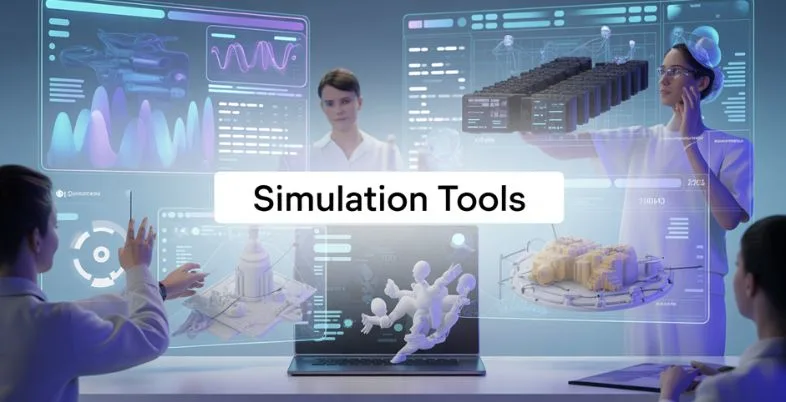Managing a business without adequate inventory management is just like driving a car with your eyes shut. You are never sure what you have, what you need, or what is running out. This is the place where an Inventory Management System will be your best friend. In the modern business environment, which is extremely fast-paced, it is not only a challenge but also a near impossibility to monitor products manually.
The Management Systems will assist both large and small businesses in monitoring their merchandise, optimizing their inventory, and making informed decisions regarding sales. You make a small shop or a big warehouse, but the correct system can help you save time, money, and numerous headaches.
In this paper, we are going to discuss the 10 Inventory Management Systems. We will dissect all this in simple language so that you can select the best solution for your business. We will get into it and find out how these systems will revolutionize your inventory management.
What are Management Systems?
An Inventory Management System is software that aids businesses in the management and monitoring of their inventory. Imagine it is like a digital assistant that is fully aware of what products you own, their whereabouts, and the quantity available.
These systems operate by ensuring that all items that enter your business are recorded, and all the items that leave are recorded. They store this information at a single location and at a place where you can easily access it. An Inventory Management Systems automatically counts products instead of counting them manually by hand or using a messy spreadsheet. This is done automatically.
Key Features to Look for in Management Systems
- Real-Time Tracking: This system must have the current stock displayed at any time, automatically updating when the products are received and leave the store.
- Barcode Scanning: Find those systems that support scanning of barcodes or QR codes, and make the process of counting and tracking products fast and precise.
- Low Stock Alerts: The system must also alert when the products are low, and this way, you can reorder before you run out.
- Multi-Location Support: When you have more than one store or warehouse, you need to select one that manages inventory in all the stores and warehouses using a single dashboard.
- Integration Capabilities: The most suitable Inventory Management Systems integrates with your accounting software as well as online shops and other business applications that you already have.
Top 10 Inventory Management Systems for 2026
1. Zoho Inventory

Zoho Inventory is an efficient cloud-based Inventory Management Systems that is suitable for developing businesses. It is compatible with the leading e-commerce websites such as Amazon, eBay, and Shopify. The system is a real-time inventory tracker of various warehouses and sales channels. Zoho Inventory is memorable due to its easy-to-use interface and low pricing model. It entails such functions as order management, tracking inventory, and shipping integration. The platform aids the businesses in controlling all their order fulfillment process under a single location.
Key Features
- Multi-channel selling facilities.
- Automated reorder points notifications.
- Ultramodern reporting and analytics.
Pros
- Extremely low-cost pricing schemes.
- Good connectivity to Zoho.
- Easy to learn interface
Cons
- Lack of customization facilities.
- Basic features in the starter
- Support response can delay
Best For: Small businesses
Pricing: Free plan available; Paid plans start at $29/month
Website: https://www.zoho.com/inventory/
2. QuickBooks Commerce

QuickBooks Commerce (previously TradeGecko) is a full-fledged Inventory Management System, ideal for integration with QuickBooks, which many companies use for accounting. This retail Inventory Management System provides end-to-end inventory control with powerful B2B capabilities. The platform is also highly efficient in handling sophisticated inventory across numerous locations and points of sale.
Alongside traditional inventory features, it can work seamlessly with AI Risk Management Tools to help businesses anticipate supply chain disruptions and improve decision-making. QuickBooks Commerce offers enhanced facilities such as demand forecasting, batch and expiry tracking, and automatic purchase orders. The system also connects well with major e-commerce sites and transportation companies, providing detailed insights into inventory performance through customizable reports and dashboards.
Key Features
- Professional demand forecasting software.
- A B2B e-commerce portal was included.
- Steamless QuickBooks accounting integration.
Pros
- It The best when used in wholesale enterprises.
- Good reporting facilities at hand.
- Creation of purchase orders automatically.
Cons
- Its pricing is higher than that of the rivals.
- Complex setup for beginners
- Limited free trial period
Best For: Wholesalers
Pricing: Starts at $39/month
Website: https://quickbooks.intuit.com/quickbooks-commerce/
3. Fishbowl Inventory
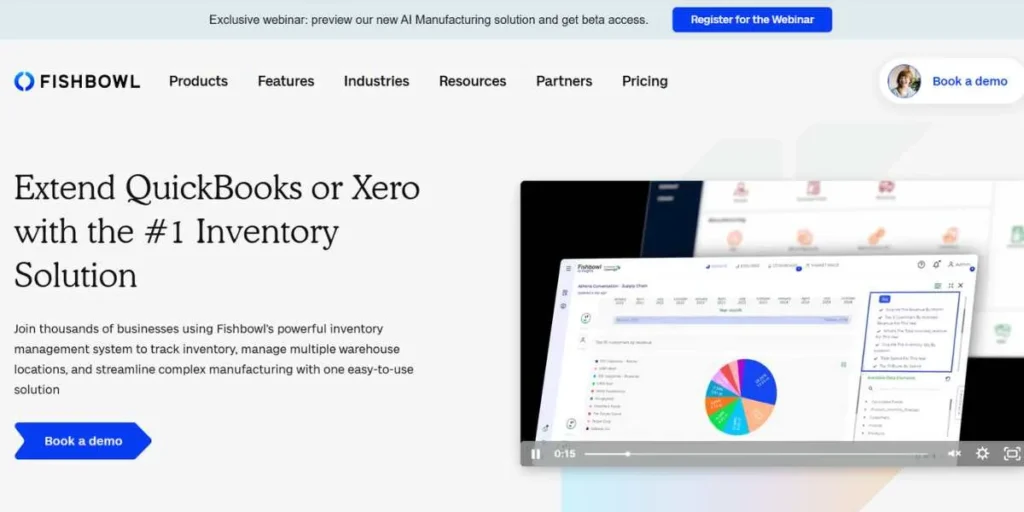
Fishbowl is an effective Inventory Management Systems, which specializes in warehouse management and manufacturing. This supply chain management software offers advanced features for businesses with complex inventory needs.
Fishbowl offers entire inventory tracking, manufacturing management, and warehouse optimization software. The system also interacts directly with QuickBooks, and therefore, accounting is also easy for those who are already using QuickBooks. It facilitates barcode reading, multi-location facility, and a high-performance reporting facility.
Key Features
- Manufacturing management and BOM management.
- Barcode and RFID scanning
- Multi-location warehouse management Sharing.
Pros
- Superior when it comes to producing companies.
- Strong QuickBooks connectivity is present.
- Extensive featureset provided.
Cons
- High initial training.
- More expensive compared to others.
- Needs special training hours.
Best For: Manufacturers
Pricing: Starts at $329/month
Website: https://www.fishbowlinventory.com/
4. inFlow Inventory
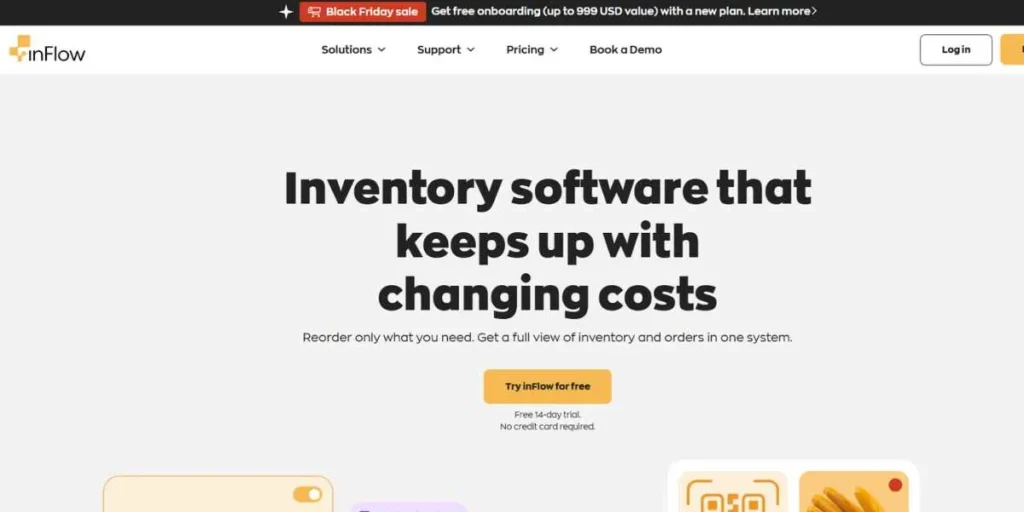
InFlow Inventory Product is an easy-to-use Inventory Management Software ideal for small and medium businesses. This inventory software for small businesses offers a perfect balance between powerful features and ease of use. inFlow provides comprehensive tools for order management, purchasing, and inventory tracking. The system is barcode scanning-friendly, which makes its stock management more rapid and more precise. InFlow has both cloud-based and desktop variants of the system that allow businesses the option of flexibility in deployment.
Key Features
- Barcode scanning in easy mode.
- Extensive purchase order management.
- Built-in customer and vendor
Pros
- Extremely easy-to-use interface design.
- Cost-effective for small businesses.
- Good customer service department.
Cons
- Poor integration possibilities.
- Simple e-commerce is available only.
- There is a need to improve the mobile app.
Best For: SMBs
Pricing: Free plan available; Paid plans start at $89/month
Website: https://www.inflowinventory.com/
5. Cin7
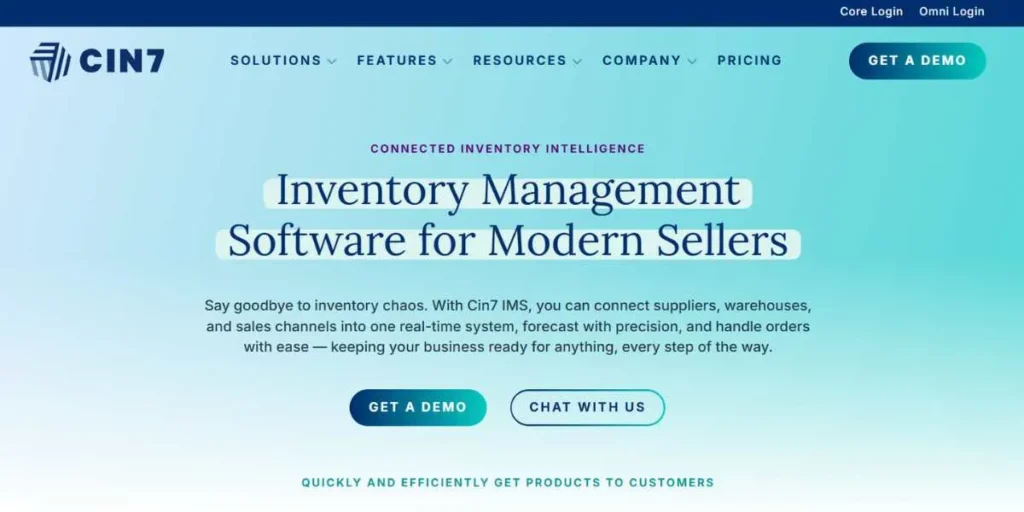
Cin7 is a total Inventory Management Systems, which integrates inventory management, point-of-sale, and manufacturing applications. It is an all-in-one solution encompassing the assembly of the products to the sales tracking in various channels. Cin7 provides real-time inventory capability in the warehouses, retailers, and online stores. The system offers potent automation capabilities that ease the process of orders and delivery. Cin7 is compatible with more than 700 applications, including the big e-commerce platforms and accounting programs.
Key Features
- Linked POS system integration.
- Third-party logistics support of the warehouse.
- Production and assembling capacity.
Pros
- Extremely flexible fornesses
- Numerous integration capabilities.
- Strong automation capabilities were added.
Cons
- Too costlyforo small businesses.
- A complex set-up process is needed.
- It may be difficult at the beginning.
Best For: Omnichannel
Pricing: Starts at $325/month
Website: https://www.cin7.com/
6. Ordoro
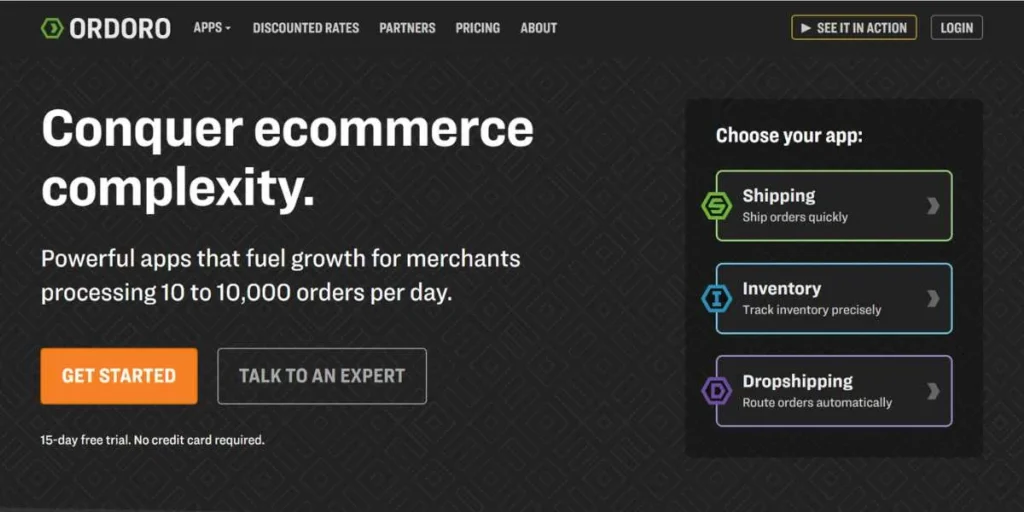
Ordoro is an Inventory Management System that is a simplified solution specializing in shipping and fulfillment, and inventory tracking. This automated stock management system, complemented by integrated Employee Management Tools, is perfect for e-commerce businesses looking to simplify their operations. Ordoro is linked to all the large e-commerce platforms and marketplaces, which combine orders across different platforms. The system has superior shipping services, including automatic printing of labels and real-time shipping rates.
Key Features
- Comparison of multi-carrier shipping rates.
- Robotized dropshipping supplier routing.
- Bentley 360 order management dashboard.
Pros
- Excellent shipping features were available.
- Easy to use interface
- Good free plan option
Cons
- Limited manufacturing characteristics incurred.
- Simple reporting facilities.
- Fewer integrations than competitors.
Best For: E-commerce
Pricing: Free plan available; Paid plans start at $59/month
Website: https://www.ordoro.com/
7. DEAR Inventory
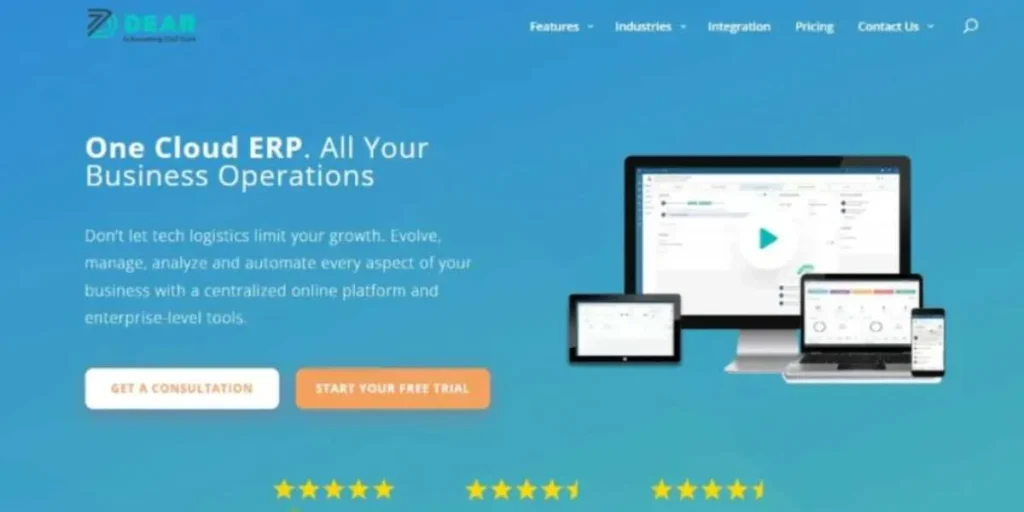
Dear Inventory is an advanced Inventory Management Systems that is capable of complex inventory requirements of product-based companies. This supply chain management software offers comprehensive features for manufacturing, wholesale, and retail operations. DEAR offers a high level of inventory, such as batch tracking, expiry date tracking, and serial number tracking. The system is integrated with Xero, Shopify, WooCommerce, and lots of others.
Key Features
- Complex manufacturing BOM control.
- Batch and expiry tracking
- Full Xero integration functionality.
Pros
- Well-developed platform on offer.
- Powerful manufacturing instruments were comprised of.
- Good reporting capabilities are offered.
Cons
- Only a premium price structure.
- Rapid acquisition of knowledge at first.
- Complex for basic needs
Best For: Manufacturing
Pricing: Starts at $249/month
Website: https://dearsystems.com.cn/
8. Sortly

Sortly is a graphic Inventory Management Systems that simplifies the process of keeping track of inventory and makes it easy to use. This mobile-first inventory software for small businesses uses photos and QR codes to help you track items easily. Sortly is designed so that you can sort inventory by creating custom folders, tags, and filters to have easy access. The system is completely compatible with smartphones and tablets, which is why it is suitable for the field. Sortly has such features as low stock warnings, custom fields, and item histories.
Key Features
- Image scanning inventory tracking.
- Custom QR code generation
- Mobile first design and functionality.
Pros
- Extremely easy to use
- Great for visual tracking
- Low-cost pricing schemes are offered.
Cons
- Very few advanced features are provided.
- Simple reporting facilities.
- Not ideal for manufacturing
Best For: Visual tracking
Pricing: Free plan available; Paid plans start at $29/month
Website: https://www.sortly.com/
9. Katana
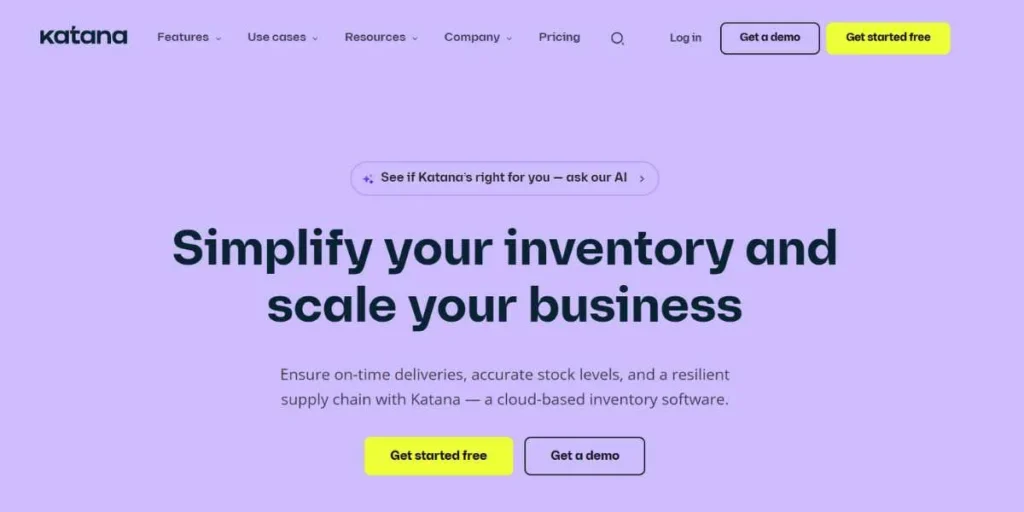
Katana is the contemporary Inventory Management Systems that is specifically created to suit manufacturers and makers. This cloud-based automated stock management system provides real-time inventory visibility and production planning. Katana provides graphical production scheduling, making manufacturing management an intuitive and efficient activity. Its system automatically adapts the material needs as per your production schedule and sales orders. Katana can be integrated with Shopify, WooCommerce, QuickBooks Online, and Xero.
Key Features
- Board of Visual Production Planning
- Automation of material requirements planning.
- Real-time inventory availability tracking.
Pros
- Small manufacturers are perfect with this one.
- Easy-to-use graphical design.
- Good Shopify integration is present.
Cons
- Only able to produce focus.
- Can be expensive scaling
- Fewer integrations than competitors.
Best For: Makers
Pricing: Starts at $179/month
Website: https://katanamrp.com/
10. Unleashed
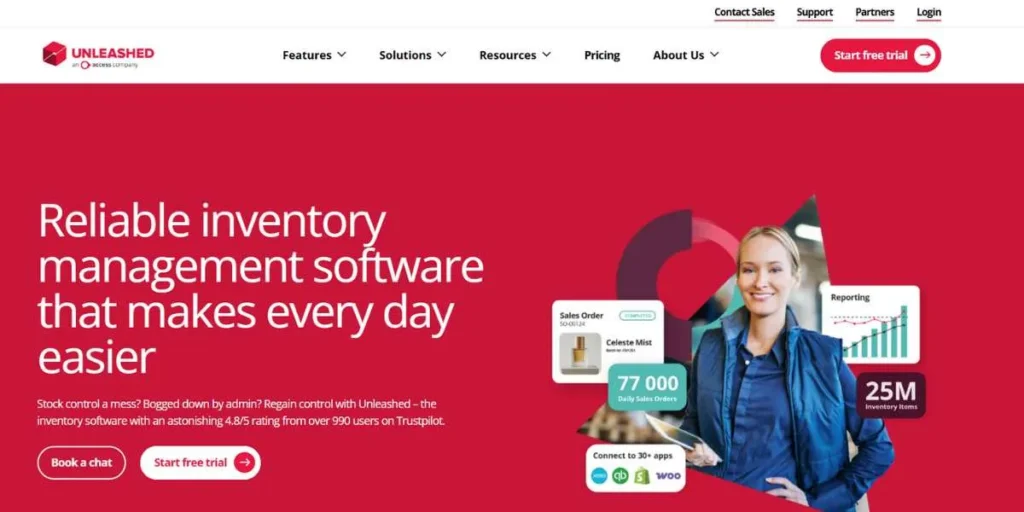
Unleashed is an integrated Inventory Systems suitable for companies that require real inventory information. This retail Inventory Management Systems offers powerful features for manufacturers, wholesalers, and distributors. Unleashed gives you total control of your inventory, both raw materials and finished products. The system has sophisticated functions such as batch tracking, serial number tracking, expiry date, and landed cost calculations. Unleashed can be integrated with mainstream accounting software, e-commerce,e and POS.
Key Features
- Efficient and hi-tech batch and serial tracking.
- Landed cost calculations inddetail
- Support multi-currency transaction.
Pros
- Large range of features supported.
- Powerful Xero integration processes.
- Good reporting tools are availed.
Cons
- The increased learning curve in the beginning.
- Only premium price structure.
- CA’s complicated installation procedure.
Best For: Distributors
Pricing: Starts at $380/month
Website: https://www.unleashedsoftware.com/
Common Mistakes to Avoid
- Basing the selection on a price-only basis: The lowest-priced Inventory Systems may not have the features you require, which will cost you in the long run due to inefficiency.
- Ignoring Scalability: Choose one that can be expanded with your business because you will have to undergo the costly and time-consuming process of changing platforms in the future.
- Skipping Employee Training: The most effective Inventory Systems will not be of any help in case your team is not aware of how to utilize it correctly and effectively.
- Failure to Check Integration Capabilities: Not checking that the system is compatible with your existing software may cause data silos, as well as duplication of work by your team.
- Overlooking Mobile Access: In this day and age of mobile technology, being unable to access your Inventory Management Systems through a smartphone can greatly restrict the flexibility and the ability to respond.
Conclusion
Selecting an appropriate Inventory Systems will be among the best decisions that you will make about your business. The appropriate system saves time, minimizes errors, and assists you in making improved decisions about your inventory. Whether you need a simple inventory software for small businesses like Sortly or a comprehensive supply chain management software like Cin7, there’s a perfect solution for every business.
It is important to have in mind that you can only have the best Inventory Management Systems that suits your needs, budget, and technical abilities. Don’t rush this decision. Make a time to explore and compare alternatives, engage your team in decision-making, and consider your future development. Once installed with the right system, you will just wonder how you were able to do without it.
FAQs
Which Inventory Management Systems is the most suitable for small businesses?
InFlow Inventory and Sortly are good solutions for small businesses. They both have low prices with free or low costs of entry. They are simple to use and do not need a lot of training, whereas inFlow offers more detailed functionality, whereas Sortly is easier, more visual in terms of inventory tracking.
Does it mean that an Inventory Management Systems can be used with my current accounting software?
Yes, the vast majority of contemporary Management Systems are connected with such popular accounting programs as QuickBooks, Xero, and Sage. The integration list is to be checked before system selection, so that you can be able to determine whether this system would integrate with your particular accounting platform. Such integration eradicates data entry twice and ensures that your financial records are correct.
Do I require a cloud-based or a premise-based Inventory Management Systems?
Most businesses would tend to use cloud-based systems due to the option of mobile access, automatic updates, and cheaper initial costs. Businesses that have a certain level of security needs or unreliable internet connections may need on-premise systems. The modern results of cloud-based solutions are more beneficial to most businesses.
What is the average cost of an Inventory Management Systems?
Prices are extremely differentiated by features and business size. Simple applications, such as Sortly, begin at $29/month, and more complex solutions, such as Unleashed, may cost as much as $380/month and above. Most of the systems have free plans available for very small businesses. Think about your budget, time, and money that you will save by using enhanced efficiency.
What is the time required to install an Inventory Management Systems?
The time taken to implement is based on the nature of your business and the system that you adopt. It takes just a few days to install simple systems (such as Sortly) and several weeks to install more complex systems (such as Fishbowl). However, most cloud-based systems enable one to begin with simple functionality immediately and increase complexity as you learn the system.





